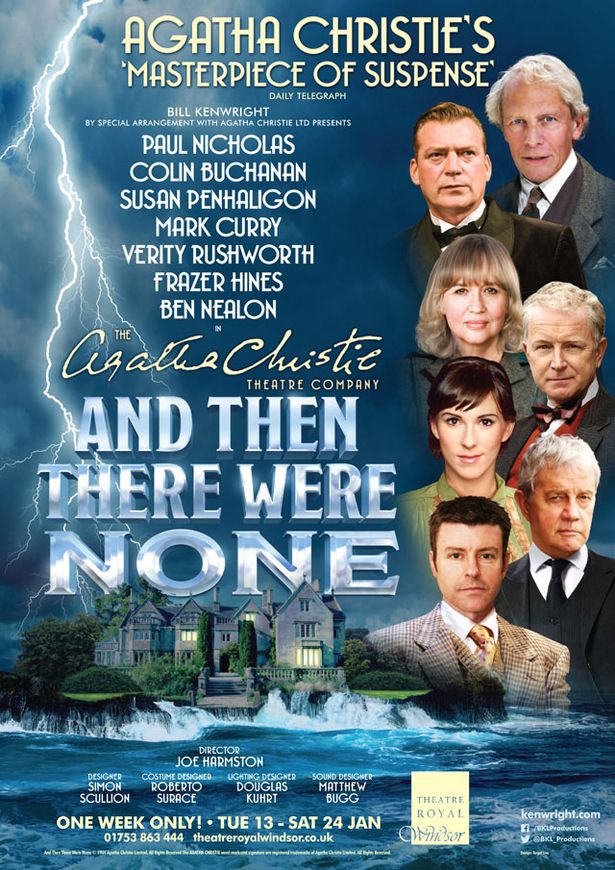
When the group locks things up, they do so in cases with multiple locks, giving one key to Lombard and Blore with the idea that neither of them would be able to take it from the other without causing a ruckus the others would hear.

In the novel, much is made of the fact that Lombard and Blore are the most physically strong. Still, since Lombard’s multiple murder is still awful even without it being racially motivated-and because the racism is just present without being much remarked upon-I think I’ll give this one to the series. On the other hand, Lombard being actively racist makes him considerably worse, like top two bad. He brings a bit of the real world onto the island, demonstrating that no matter how isolated you might be, you can never be entirely cut off from the world at large. Irish Lombard contributes to the setting and period of the piece, which could otherwise be almost any time or place. He’s an Irish murderer in 1939 who brought a gun to a mysterious island. He’s not just a murderer who brought a gun to a mysterious island. Although his nationality is not specified in the novel (he’s assumed English), TV’s Lombard is Irish and the others to regard him with added suspicion.
And then there were none series#
Interestingly, the series brings in racism in a different way. Series Lombard killed people, yes, but he wasn’t racist about it. It’s also implied that he would have felt the same about the crime if the men had not been East African. Yeah, he’s a killer, but unlike the other nine he admits that he’s a killer, to himself and to the others. Lombard is still unapologetic for the deaths, but it is depicted as him owning up to his crimes. The series presents it a little differently. In the novel, Lombard callously implies that killing these East African men is nothing because they are less human than the English, and therefore care less about dying. He disparages the Jewish Isaac Morris, and-more damning-is guilty of causing the deaths of twenty-one men, members of an East African tribe. The series softens Lombard in some ways (it hardens him in others, but we’ll get to that later). The miniseries is about three hours long all told, and the book will take you only slightly longer. If you don’t know And Then There Were None yet, do yourself a favor and check it out. I don’t know if it’s strictly speaking necessary to slap a spoiler warning on a post about a book that was published in 1939, but in case it is, this is that warning. Since this is an in-depth comparison, I’d recommend against reading it unless you’re okay with spoilers or have already either watched the series/read the book. On the first night, a mysterious voice accuses each of them of murder and in the days that follow they are meticulously killed off one-by-one. Ten strangers are invited to a mysterious island, but when they arrive, they realize that they were summoned under false pretenses. Like I said, And Then There Were None is my favorite.Īlso, it’s just been way too long since I’ve done a super-nerdy, extremely over-involved post. This isn’t the first time I’ve done an Agatha Christie book-to-series comparison post, but it is by far the most detailed. If I enjoy something, instead of moving on like a normal person, I ask how can I extend this for as long as possible? So I reread the book, taking notes of all the differences so that I could write a detailed comparison between the two. As I’ve mentioned here before, I get obsessive. We finished the series and less than an hour later I’d pulled out my well-worn copy of the novel. *cancer isn’t specified, but he was dying the reader doesn’t find out about it until much later than in the series If you don’t remember the murderer, you’re unlikely to remember whether or not Wargrave had cancer.* I rewatched the series with my family, and although they’d all seen it before, it had been long enough that they’d forgotten even more than I had, so when I’d tentatively ask wasn’t this bit different in the book? no one could definitively answer me. It’s the only adaptation I’ve seen (not counting the computer game, which I loved), and from what I can tell, it’s the most faithful one. It’s very faithful but makes a few minor changes.

I’ve read And Then There Were None multiple times over the years, because it’s so psychologically fascinating that it’s thrilling even if you already know whodunit. And Then There Were None is one of my two absolute favorite mystery novels (the other is The Westing Gameby Ellen Raskin, and they’re in a league of their own). Recently, I rewatched the excellent BBC adaptation of And Then There Were None by Agatha Christie.


 0 kommentar(er)
0 kommentar(er)
